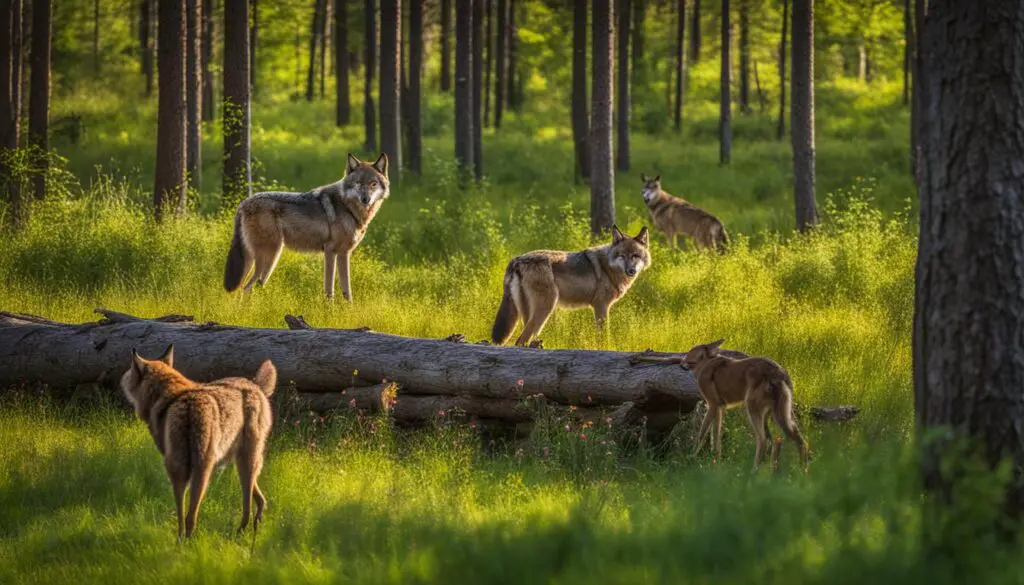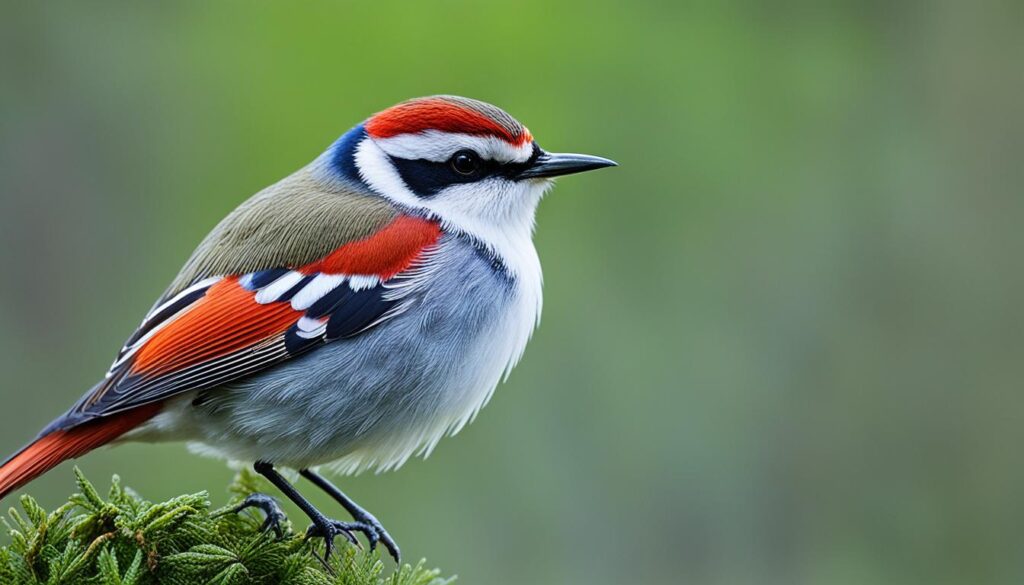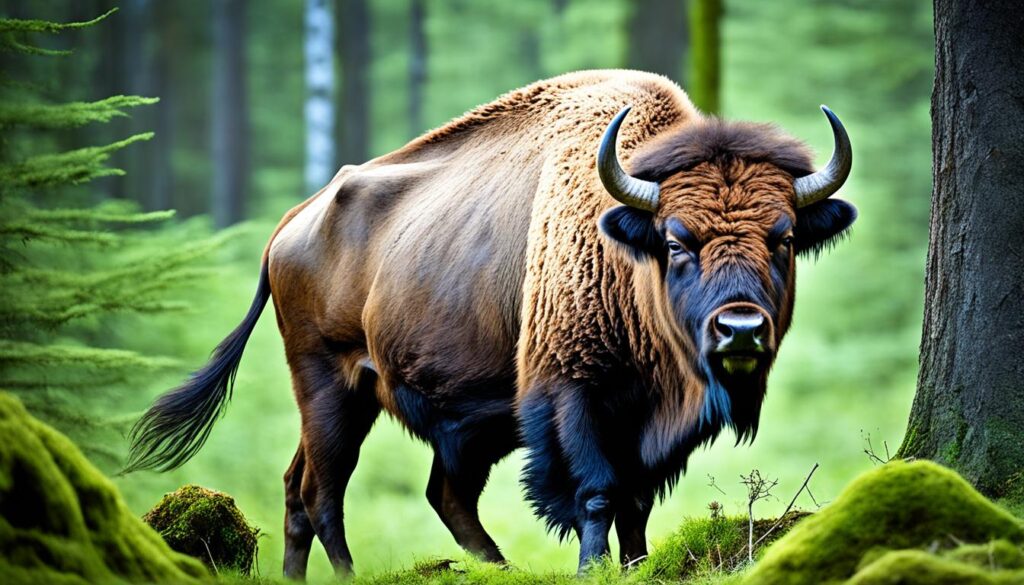Did you know that Lithuania is home to a remarkable array of wildlife, boasting a staggering 68 mammal species alone? From bats and rodents to hedgehogs and carnivores, Lithuania’s diverse ecosystems support a rich variety of animals, each playing a vital role in the country’s natural heritage. Whether you’re a nature enthusiast or simply curious about the intriguing world of Lithuanian wildlife, prepare to be captivated by the incredible creatures that call this Baltic nation home.

Key Takeaways:
- Lithuania is home to 68 mammal species, including bats, rodents, hedgehogs, and carnivores.
- The conservation status of these species varies, with some being extinct, endangered, or vulnerable.
- The country’s national parks and nature reserves play a crucial role in protecting and preserving Lithuania’s wildlife.
- Birdwatching enthusiasts can explore the diverse avian species in national parks like Curonian Spit and Vente Cape.
- Lithuania also has a vibrant domestic animal population, including sheep, horses, cows, dogs, and cats.
Mammals of Lithuania
Lithuania is home to a diverse range of mammal species, adding to the country’s rich wildlife. These mammals play a vital role in the ecosystem and are a significant part of Lithuania’s natural heritage. Some of these species are endangered or vulnerable, highlighting the need for conservation efforts to protect their populations. Let’s take a closer look at some of the remarkable mammals found in Lithuania.
1. Bats
Bats are an essential part of Lithuania’s ecosystem, contributing to insect control and pollination. With several species residing in the country, including the Nathusius’ pipistrelle and the common noctule, bats are an intriguing mammal group to study and appreciate. Their unique ability to navigate through echolocation makes them fascinating creatures to observe.
2. Rodents
Rodents make up a significant proportion of the mammal species found in Lithuania. These small mammals are well-adapted to various habitats, from fields to forests. Some notable rodent species include the European beaver, known for its impressive engineering skills, and the Eurasian beaver, which is sadly locally extinct. The water vole and the common shrew are also commonly found in Lithuania.
3. Hedgehogs
A familiar sight in Lithuanian gardens, hedgehogs are widespread and well-loved creatures. These spiky mammals are known for their nocturnal habits and ability to curl up into a protective ball when threatened. They play an essential role in maintaining balance within the ecosystem by controlling the population of insects and small invertebrates.
4. Carnivores
Lithuania is home to a variety of carnivore species, each with its unique characteristics. While some carnivores, such as the brown bear and the European mink, are locally extinct, efforts are being made to reintroduce them into their natural habitats. The presence of carnivores in Lithuania showcases the country’s commitment to preserving its rich biodiversity.
5. Whales
A unique aspect of Lithuania’s mammal diversity is the presence of whale species in the Baltic Sea. While not as commonly seen as in other parts of the world, the Baltic Sea is home to minke whales and harbor porpoises. These majestic creatures add to the charm and allure of Lithuania’s coastal regions.
These are just a few examples of the fascinating mammal species found in Lithuania. It is essential to continue efforts to protect and conserve these animals and their habitats to ensure their survival for future generations. By safeguarding Lithuania’s wildlife, we are preserving a vital part of the country’s natural heritage.
Bird species in Lithuania
Lithuania is a haven for bird enthusiasts with its diverse array of avian species. From majestic white storks to graceful herons and powerful eagles, the country’s landscapes are teeming with life. The Baltic Mythology Park, showcasing 80 oak sculptures, serves as a testament to the region’s rich cultural heritage.
The Curonian Spit National Park is a popular destination for birdwatching, attracting numerous migratory birds throughout the year. This park, renowned for its picturesque sand dunes, provides a perfect backdrop for observing stunning species. Another noteworthy birdwatching site in Lithuania is the Vente Cape, where visitors can marvel at the impressive flocks of birds.

Bird Species Diversity in Lithuania
| Species | Common Name |
|---|---|
| 1 | White Stork |
| 2 | Duck |
| 3 | Goose |
| 4 | Cormorant |
| 5 | Heron |
| 6 | Eagle |
| 7 | Tit |
| 8 | Woodpecker |
These are just a few examples of the stunning bird species that can be found in Lithuania. The country’s commitment to preserving its natural habitats ensures the continued presence of these avian wonders. Whether you’re an avid birder or simply appreciate nature’s beauty, Lithuania’s birdwatching opportunities are sure to leave you captivated.
Endangered animals in Lithuania
While Lithuania is known for its diverse wildlife, it is important to highlight and address the conservation efforts for endangered animal species. The Lithuanian government has recognized the need to protect these vulnerable creatures and has implemented measures to ensure their survival.
Endangered Animal Species
Several animal species in Lithuania are classified as endangered or vulnerable, including:
- European Mink
- Siberian Flying Squirrel
- Brown Bear
These species are facing significant threats, such as habitat loss, climate change, and illegal hunting. It is crucial to take immediate action to safeguard their existence.
Conservation Efforts
The Lithuanian government, in collaboration with conservation organizations, has established national parks and nature reserves to protect and preserve these endangered animals. These protected areas provide sanctuaries for the animals to thrive and ensure their long-term survival.
There are currently five national parks in Lithuania that play a crucial role in wildlife conservation:
- Curonian Spit National Park
- Kursiu Nerija National Park
- Dzukija National Park
- Zemaitija National Park
- Aukstaitija National Park
These national parks not only offer a safe haven for endangered animals but also serve as educational platforms for visitors to learn about the importance of wildlife conservation.
Protecting the Future
The conservation status of each endangered species is assessed based on the criteria set by the IUCN Red List. Through careful monitoring and collaborative efforts, ongoing research and conservation strategies are implemented to improve the conditions for these animals and increase their chances of survival.
Preserving the biodiversity of Lithuania is not only crucial for the ecosystems but also for the cultural and ecological identity of the nation. By understanding the significance of these endangered animals and supporting conservation efforts, we can protect these unique creatures for future generations to admire and appreciate.

Lithuanian wildlife conservation
Lithuania is deeply committed to the conservation of its wildlife and natural habitats. The country has established five national parks that serve as protected areas for endangered species and provide opportunities for visitors to experience the beauty of nature. These parks are:
- Curonian Spit National Park
- Kursiu Nerija National Park
- Dzukija National Park
- Zemaitija National Park
- Aukstaitija National Park
Each of these national parks plays a crucial role in the preservation and protection of Lithuanian wildlife. They offer a safe haven for endangered species to thrive and ensure the long-term sustainability of their populations. Additionally, these parks serve as educational and recreational destinations for visitors, allowing them to appreciate and connect with nature.
| National Park | Location | Area (km2) | Main Attractions |
|---|---|---|---|
| Curonian Spit National Park | Curonian Spit | 262 | Diverse ecosystem, sand dunes, migratory birds |
| Kursiu Nerija National Park | Neringa | 49 | Coastal landscapes, cultural heritage |
| Dzukija National Park | Varėna, Alytus, Druskininkai | 552 | Ancient forests, lakes, wildlife |
| Zemaitija National Park | Plateliai, Telšiai | 217 | Lakes, traditional culture, biodiversity |
| Aukstaitija National Park | Molėtai, Ignalina, Utena | 405 | Crystal-clear lakes, forests, ethnographic heritage |
These national parks are not only crucial for the conservation of Lithuanian wildlife but also act as important hubs for scientific research and environmental education. They offer visitors the chance to engage in various activities such as hiking, birdwatching, and wildlife photography. By promoting sustainable practices and raising awareness about the importance of nature conservation, Lithuania aims to protect its wildlife for future generations.
Domestic animals in Lithuania
In addition to the diverse range of wildlife, Lithuania also has domestic animals commonly found on farms or as house pets. These animals play an important role in agricultural practices and provide companionship to households. Some of the common domestic animals in Lithuania are:
- Sheep
- Horses
- Cows
- Pigs
- Goats
- Dogs
- Cats
- Ducks
- Geese
- Chickens
These animals contribute to the agricultural economy of Lithuania and are an integral part of traditional farming practices. Moreover, they provide companionship and joy to households across the country.
If you’re interested in learning more about domestic animals in Lithuania and experiencing them up close, the Zemaitija National Park and Neris Regional Park are popular destinations. These parks offer educational programs and opportunities to learn about and interact with the domestic animals that are a part of Lithuania’s cultural heritage.
Common Domestic Animals in Lithuania
| Animal | Role in Agriculture | Commonly Kept as a Pet |
|---|---|---|
| Sheep | Wool production, meat | Yes |
| Horses | Transportation, farming, recreation | Yes |
| Cows | Milk production, meat | Yes |
| Pigs | Meat production | Yes |
| Goats | Milk production, meat | Yes |
| Dogs | Guarding, herding, companionship | Yes |
| Cats | Companionship, pest control | Yes |
| Ducks | Egg production, pest control | Yes |
| Geese | Meat production, pest control | Yes |
| Chickens | Egg production, meat | Yes |
Wildlife parks in Lithuania
Lithuania offers a range of wildlife parks and reserves that provide opportunities for visitors to immerse themselves in the beauty of nature and observe various animal species up close. These parks not only serve as sanctuaries for wildlife but also offer educational programs and guided tours to enhance visitors’ understanding of Lithuania’s diverse ecosystems.
Bison Paddock of Pasiliai
One popular destination for wildlife enthusiasts is the Bison Paddock of Pasiliai. Located in the Labanoras Regional Park, this park is home to a thriving population of European bison, the continent’s heaviest land animal. Visitors have the chance to witness these magnificent creatures in their natural habitat, observing their behavior and learning about ongoing conservation efforts to protect this endangered species.
Kursiu Nerija National Park
The Kursiu Nerija National Park is another must-visit destination for nature lovers. Situated along the Curonian Spit, a unique sand dune peninsula shared by Lithuania and Russia, this park boasts diverse habitats, including forests, sand dunes, and wetlands. Here, visitors can discover a wide range of wildlife, including migratory birds, rare plant species, and the iconic Curonian wild horses.
Dzukija National Park
For those seeking an authentic wilderness experience, Dzukija National Park is the perfect choice. Located in the southern part of Lithuania, this park offers unspoiled forests, pristine lakes, and picturesque rivers. Visitors can explore the park’s extensive network of hiking trails, marvel at the enchanting beauty of natural landscapes, and encounter a variety of wildlife, including roe deer, foxes, and various bird species.
Zemaitija National Park
Zemaitija National Park is a nature lover’s paradise, characterized by its unique blend of cultural and natural heritage. This park is home to dense forests, tranquil lakes, and picturesque landscapes, providing a haven for diverse flora and fauna. Visitors can embark on scenic boat rides, explore ancient woods, and spot wildlife such as beavers, eagles, and rare orchids.
Aukstaitija National Park
Aukstaitija National Park, situated in northeastern Lithuania, offers visitors a chance to immerse themselves in the breathtaking beauty of the region’s lakes and forests. This park is renowned for its pristine wilderness, crystal-clear lakes, and rich biodiversity. Visitors can hike along picturesque trails, enjoy boating and fishing on the park’s lakes, and spot various animal species, including elk, wild boars, and capercaillie birds.
Visiting these wildlife parks and reserves in Lithuania is not only a chance to witness the country’s natural wonders but also an opportunity to contribute to conservation efforts and support sustainable tourism practices.
Conclusion
Lithuania is a captivating destination for nature enthusiasts and animal lovers due to its remarkable Lithuanian wildlife and diverse range of animal species. From mammals to birds, the country offers an abundance of unique and fascinating species to discover and appreciate. Whether you’re exploring the expansive forests or visiting wildlife parks, Lithuania provides ample opportunities to connect with nature and observe its marvelous animal inhabitants.
One of Lithuania’s key strengths lies in its commitment to wildlife conservation. By establishing national parks and nature reserves, the country ensures the long-term preservation of its precious animal species. These protected areas serve as sanctuaries for Lithuanian wildlife, safeguarding them from threats and promoting their survival. The government’s dedication to conservation guarantees that future generations will have the chance to enjoy and marvel at the magnificent animals that call Lithuania home.
For wildlife enthusiasts, Lithuania offers a plethora of unforgettable experiences. Exploring the vast forests, you may encounter various mammals, including bats, rodents, hedgehogs, carnivores, and ungulates. Birdwatchers will be delighted by the diverse avian species found in Lithuania, such as white storks, ducks, herons, and eagles. Additionally, the country’s wildlife parks and reserves provide ample opportunities to observe and learn about Lithuanian wildlife up close.
Whether you’re captivated by the beauty of Lithuania’s nature, the diverse range of animal species, or the country’s commitment to conservation, a visit to Lithuania promises an enriching experience. Immerse yourself in the wonders of Lithuanian wildlife and cherish the memories of encountering these incredible creatures amidst the country’s stunning natural landscapes.
